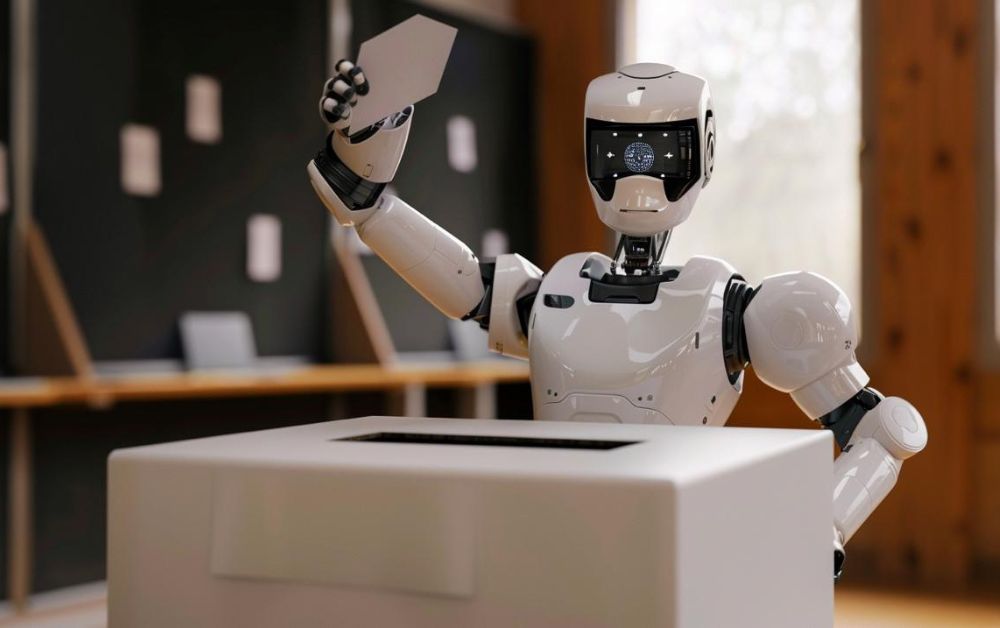Elections are messy, noisy and can overwhelm voters with too much information and too many choices. In the future, it could make sense for us to rely on our personal AI assistants – algorithms trained on our preferences, understanding our worldviews and able to mimic who we are in communications and interactions – to analyse every politician, their promises, their track record and what we expect them to be able to achieve, and advise us on the best person to vote for in any given election.
It’s a great application of the power of data analytics and pattern recognition that GenAI apps are capable of, and it would probably help voters make more informed choices… rather than voting based on charisma, fears or history.
TRANSCRIPT
Forget the messiness of a democratic election, why don’t we just let our personal AI assistance do the voting for us?
My name is Graeme Codrington. This is ThrowForward Thursday, and let’s jump into the future and see what’s going on there. In 2024, nearly 70 countries, accounting for about half of the world’s population, have had elections, and that stretches East, West, North, South, and many of those elections have been very noisy.
In most countries, there’s lots of information coming at us, lots of different candidates with lots of different viewpoints, and unless you’re a real political junkie, you might just let that noise pass you by or be overwhelmed by it. We don’t know what all the options are, we don’t know what the possibilities from the election are, so often we just stick to the devil that we know, or maybe more and more around the world, people are just choosing not to vote at all.
So, here’s an idea. If generative AI, and maybe in the future, even proper artificial generalised intelligence, a GI, is able to help us, we can develop a system, a Generative AI bot that can know who we are. We can essentially have a personalised assistant. I think this is what’s probably going to come in the next few years that will really make generative AI useful, that it understands who we are as individuals, it learns our style, it reads our emails, and listens to our conversations, but gets a sense of who we are and is able to write things and to do things in our tone. And we begin to trust these personalised AI systems to be a mimic of me in society, but at least it knows who I am and what I believe.
Then we could take those systems and ask it to read all of the manifestos of the different political parties, listen to the various speeches that these people make, analyse their history. In other words, way more work and way more detail than most of us as individuals are prepared to give for choosing who we’re going to vote for, and then we can ask the AI to match those two. Who do you think my wonderful AI assistant? who do you think is going to be the person most aligned with who I am? Who do you think I should vote for?
Maybe it’s a step too far to actually allow those AI assistants to cast a digital on our behalf. Just let democracy get on in the background without bothering me in my diary. And now, of course, I’m beginning to worry about all of the security that would need to be around these systems and how we would handle all of that. So maybe we just go back to letting our personalised AI bots assist us in finding out who we should be voting for if we want to vote out of who we are to get the future we’re hoping for.
Future elections, maybe not quite as noisy and messy as they are now. Thank you, as always, for joining me in the future. Sorry, we don’t have these systems available for the noisy, messy elections we’ve had this year. I’ll see you again next week in the future, again.
At TomorrowToday Global, we help clients around the world analyse major global trends, developing strategies and frameworks to help businesses anticipate and adapt to market disruption in an ever-changing world.
Subscribe to our team’s weekly newsletter filled with insights and practical resources to help you succeed in the future of work.
For all enquiries, please use this email: [email protected]
Graeme Codrington, is an internationally recognised futurist, specialising in the future of work. He helps organisations understand the forces that will shape our lives in the next ten years, and how we can respond in order to confidently stay ahead of change. Chat to us about booking Graeme to help you Re-Imagine and upgrade your thinking to identify the emerging opportunities in your industry.
For the past two decades, Graeme has worked with some of the world’s most recognised brands, travelling to over 80 countries in total, and speaking to around 100,000 people every year. He is the author of 5 best-selling books, and on faculty at 5 top global business schools.


